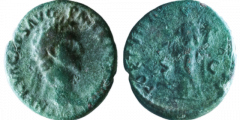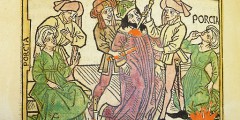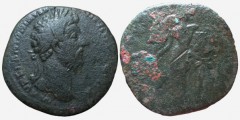The Lex Titia…
November 26, 2014
As part of the Nottingham Anniversaries through Coins project, Mike Welbourn describes how, on this day, 26th November, in 43 BC, the lex Titia was passed at Rome. By this law a board of three men was given complete control over the Roman state. The lex Titia turned Rome into a de facto dictatorship, and …
We have two blog entries today, both from doctoral students in Classics: in the first, Peter Davies, reflects on the legacy of the poet Simonides’ words in commemorating the fallen…
November 11, 2014
After the battle of Thermopylae – immortalised by Herodotus and, in our own time, given new fame by Snyder’s epic 300 – the Lyric poet Simonides wrote an encomium for the Greek dead. In 1838 John Sterling would translate some of his words thus: Of those who at Thermopylae were slain, Glorious the doom, and …
On this day, November 8th, in AD 30, Marcus Cocceius Nerva was born.
November 8, 2014
As part of the Nottingham Anniversaries through Coins project, Mike Welbourne offers some thoughts on Nerva, Rome’s twelfth emperor, on the anniversary of his birth. According to Aurelius Victor (Epitome de Caesaribus, 12.1) Nerva was born in the Italian town of Narnia. On his father’s side he came from a family that had been intimately …
Greek for the Globe
September 21, 2014
Requests for translation into ancient Greek are understandably rare. But one was passed on to Oliver Thomas recently from a friend-of-a-friend at the Globe Theatre. For their production of Julius Caesar the Globe’s creative team wanted to mark the three main deaths (those of Caesar, Brutus and Cassius) by adding a small female chorus of …
Happy birthday Marcus Aurelius!
April 26, 2014
In a new occasional series, Nottingham PhD student Will Leveritt posts his own photos of coins to reflect on significant anniversaries. 1893 years ago today, on the 26th of April A.D. 121, the Stoic philosopher and Roman emperor Marcus Aurelius was born in Rome. On the obverse of the coin we see the laureate head …
Roman noses
April 25, 2014
Mark Bradley sniffs out the significance of noses for Romans and others. Go back a hundred years or so, and well-to-do men and women in Berlin could be very conscious about their nose-shape. Anyone who had a potato nose, saddle nose or duckbill nose, or one that was wide, pointy, long, hook or slant had good …
Martial and first world problems
March 17, 2014
The first world problem meme might seem a relatively recent invention but the late first-century AD poet Martial was already playing with the idea. Some examples of #firstworldproblems: ‘Just got a splinter in my finger from an avocado stone. Guacamole injury.’ ‘No shiraz so had to use merlot in the beef bourguinon.’ featured here. More …







